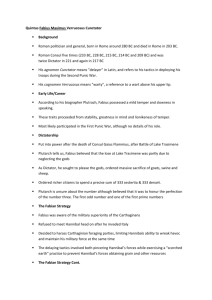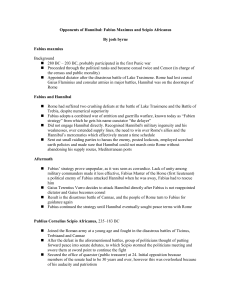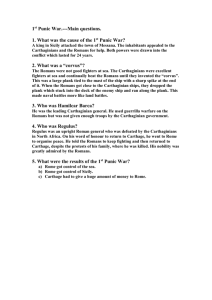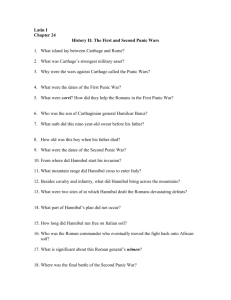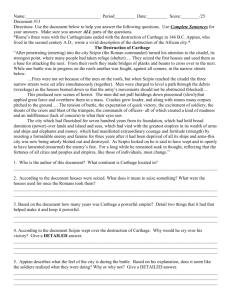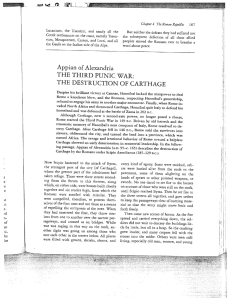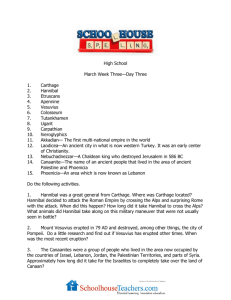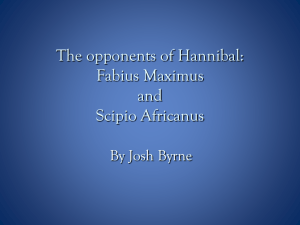Marc's Ancient
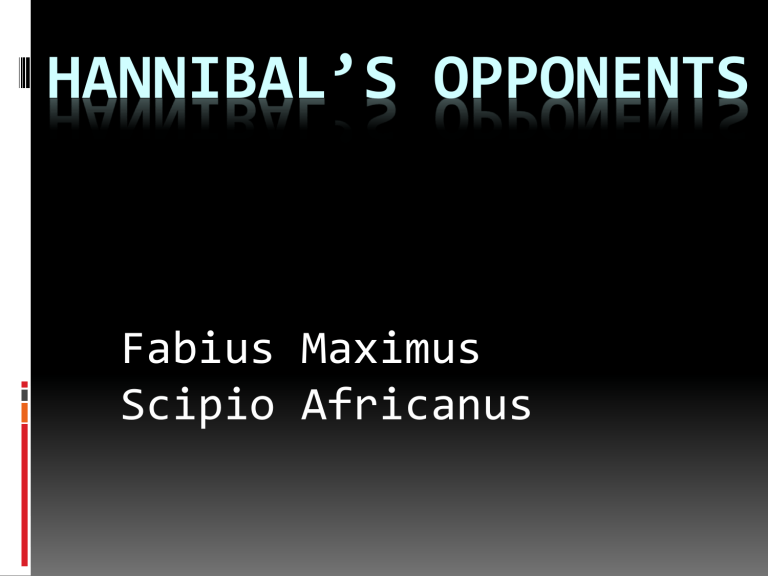
HANNIBAL’S OPPONENTS
Fabius Maximus
Scipio Africanus
Quintus Fabius Maximus Verrucosus
Cunctator
Background
Roman politician and general, born in Rome around 280 BC and died in Rome in
203 BC.
Roman Consul five times (233 BC, 228 BC, 215
BC, 214 BC and 209 BC) and was twice Dictator in 221 and again in 217 BC
His agnomen Cunctator means "delayer" in Latin, and refers to his tactics in deploying his troops during the Second Punic
War.
His cognomen Verrucosus means "warty", a reference to a wart above his upper lip.
Early Life/Career
According to his biographer
Plutrach, Fabius possessed a mild temper and slowness in speaking.
These traits proceeded from stability, greatness in mind and lionikeness of temper.
Most likely participated in the
First Punic War, although no details of his role.
Dictatorship
Put into power after the death of Consul Gaius
Flammius, after Battle of Lake Trasimene
Plutarch tells us, Fabius believed that the lose at Lake Trasimene was partly due to neglecting the gods
As Dictator, he sought to please the gods, ordered massive sacrifice of goats, swine and sheep.
Ordered richer citizens to spend a precise sum of
333 sestertia & 333 denarii.
Plutarch is unsure about the number although believed that it was to honour the perfection of the number three. The first odd number and one of the first prime numbers
The Fabian Strategy
Fabius was aware of the military superiority of the Carthaginians
Refused to meet Hannibal head on after he invaded Italy
Decided to harass Carthaginian foraging parties, limiting Hannibal's ability to wreak havoc and maintain his military force at the same time
The delaying tactics involved both pincering Hannibal’s forces while exercising a “scorched earth” practice to prevent Hannibal’s forces obtaining grain and other resources
The Fabian Strategy Cont.
Romans unimpressed with this defensive strategy and gave Fabius his epithet “Cunctator” as an insult
Strategy partly ruined, lack of unity in the army
Fabius’ Master of the Horse, Minucius, was a political enemy of Fabius
Minucius agaisnt Fabius’ command lead half of
Fabius’ army into battle against Hannibal’s troops
They were ambushed, seeing this Fabius rushed to help his army, Hannibals troops retreated
Minucius after being saved by Fabius placed himself under his rule saying , "My father gave me life. Today you saved my life. You are my second father. I recognize your superior abilities as a commander.”
After Dictatorship
Gaius Terentius Varro, took over from Fabius
Abandoning Fabius’ strategy and engaging Hannibal directly
Fabius warned the other Consul
Aemilius Paullus, to change Varro’s mind
After the Roman defeat under Varro and Paullus at the Battle of Cannae, the Senate turned to Fabius for guidance
Honours and Death
Cunctator became an honorific title
His delaying tactic was followed for the rest of the war
Own military success was small, apart from reconquest of Tarentum in 209 BC
Chief Augur (priest and official) at a young age and Pontifex Maximus (highest priest of the college of Pontiffs or priests, most important position in Roman religion). A combination not repeated until Julius Caesar
Fabius died 203, after Hannibal’s army left
Italy, but before the Roman victory over
Hannibal at the Battle of Zama
Publius Cornelius Scipio
Africanus
Background
Also known as Scipio Africanus and
Scipio the Elder
He was a general in the Second Punic
War and statesman of the Roman
Republic.
Best known for defeating Hannibal at the final battle of the Second Punic
War at Zama
Earned him the agnomen Africanus, The nickname “The Roman Hannibal”
As well as the recognition of one of the finest commanders in Roman military history
Early Military Service
Joined the Roman struggle against
Carthage in the Second Punic War
Said to have promised to his father to continue to fight the Carthaginians
(similar to Hannibal)
Survived the battles of Ticinus, Trebia and Cannae
Despite several defeats at the hands of the Carthaginians, Scipio focused on securing Romans victory over Carthage
Scipio was never again to see a Roman force defeated once he turned 25
Campaign in Hispania
211-20 BC Scipio asked to take on the campaign after his father died.
All of Hispania south of the Ebro river was under
Carthaginian control
Scipio landed at the mouth of the Ebro river and was able to capture Cathago Nova (New Carthage), headquarters of the Carthaginian power in Hispania
His treatment of prisoners and hostages portrayed the Romans as liberators rather then conquers
Livy tells a story of a women who was captured and given to Scipio, who returned her to her fiancé, bringing his tribes support to the Roman army
Campaign in Hispania Cont.
209 BC , Scipio drives back Hasbrubal Barca, from position in Baecula
Historical criticism has been levelled at Scipio’s inability to effectively pursue Hasdrubal
Most probable explanation from a strategic point would be Scipio did not want to be trapped between
Hasdrubal's army and the armies of Gisgo and Mago
After winning over a number of Hispanian chiefs,
Scipio achieved a victory in 206BC over the full
Carthaginian levy at Ilipa
Lead to the evacuation of Punic commanders from
Hispania
African Campaign
205BC elected Consulship
Wanted to go to Africa instead sent to Sicily and was not given an army
Raised a volunteer army in Sicily
Roman Senate allowed Scipio to cross from Sicily to Africa, but was given no financial or military support
203BC he defeated the combined armies of Carthage and
Numidia, by setting their camps on fire at night
Both Polybius and Livy estimate the death toll in this single attack exceeded 40,000
Historians from both sides view this tactic as either brilliant or cowardly however there is evidence to suggest that
Hannibal was planning an ambush for Scipio if he had not attacked
African Campaign Cont.
Scipio dethroned Syphax and ensured Prince
Masinissa coronation as King of the
Numidians.
Ensuring the support of their cavalry which
Carthage had relied to heavily upon
War with Hannibal
Battle of Zama
Hannibal had a trained pool of soldiers who had fought in Italy, as well as eighty war elephants.
Hannibal could boast a strength of 58,000 infantry and 6,000 cavalry, compared to
Scipio's 34,000 infantry and 8,700 cavalry
Meet on a plain between Carthage and Utica, and Scipio ended up victorious
Legacy - Military
Considered by many to be one of Rome’s greatest generals, he never lost a battle after
25
According to Livy, Hannibal regarded Scipio as a equal after Alexander and Pyrrhus
Legacy - Political
First Roman general to expand Roman territories outside of Italy and the islands around the main land
He conquered the Carthaginian territory of
Iberia
His defeat of Hannibal at Zama paved the way for Carthage's eventual destruction in
146 BC
Legacy – Political Cont.
The true measure of Scipio's character can perhaps been seen by his behaviour shortly after returning in triumph from Africa to a grateful Rome.
Scipio refused to accept demands for him to become perpetual consul and dictator. For his self restraint in putting the good of the republic ahead of his own gain
Scipio was praised by Livy for showing uncommon greatness of mind
Bibliography
Plutarch, The Parallel Lives III - The Life of
Fabius Maximus
History of Rome by Livy - Book XXVII Chapter
15: Tarentum recovered by treason[209 BC]
http://www.romanempire.net/army/zama.html
http://www.britannica.com/EBchecked/topic/
655514/Battle-of-Zama
http://www.enotes.com
